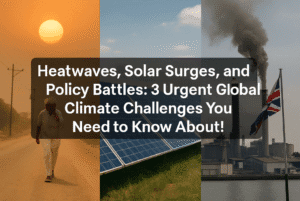Heatwaves, Solar Surges, and Policy Battles: 3 Urgent Global Climate Challenges You Need to Know About!
Record-breaking heatwaves in India and Pakistan are pushing human survival to its limits, with Delhi surpassing 40°C and rural communities facing lethal conditions. Scientists warn such extremes could become unsurvivable by 2050, while flawed heat-alert systems leave millions vulnerable. In the UK, a steel plant crisis sparked misleading attacks on net-zero policies, despite experts clarifying that outdated infrastructure—not climate goals—drives industrial decline.
Meanwhile, Nigeria’s energy crisis has fueled a solar revolution, with households and businesses adopting renewables to counter grid failures and soaring fuel costs, though affordability and substandard imports challenge progress. Globally, political tensions flare as the US axes climate programs, China prolongs coal reliance, and Peru risks Amazon deforestation. New research reveals alarming trends, including tripled marine heatwave durations and worsening snow droughts.
Amid these crises, the UN’s $250M loss-and-damage fund offers limited relief, while nations like Australia vie to host COP31, underscoring the urgent need for equitable, innovative solutions to safeguard communities and ecosystems.

Heatwaves, Solar Surges, and Policy Battles: 3 Urgent Global Climate Challenges You Need to Know About!
As climate impacts intensify worldwide, communities and governments grapple with extreme weather, political friction, and energy transitions. Here’s how three regions are confronting pressing challenges.
India and Pakistan: Heatwaves Push Human Survival to the Brink
Record-breaking temperatures have engulfed South Asia, with Delhi exceeding 40°C multiple times in April and parts of Pakistan facing anomalies 8°C above normal. Farmers like Rajasthan’s Balu Lal describe unbearable conditions: “We cannot stand to work… it feels like burning.” Climate scientists warn such heat could surpass survivability limits by 2050.
- Hidden Toll: Research estimates a single five-day heatwave causes ~30,000 excess deaths across India, disproportionately affecting rural and urban poor.
- Data Gaps: Investigations reveal India’s heatwave alerts rely on outdated systems, with automatic weather stations often yielding unreliable data—a critical flaw in preparedness.
The crisis mirrors global trends, as the Philippines also battles 50°C heat, underscoring the urgency of adaptive infrastructure and accurate forecasting.
UK Steel Crisis: Net-Zero Policies Wrongly Blamed
A collapse in talks to save Scunthorpe’s British Steel plant sparked political turmoil, with critics falsely tying the crisis to net-zero goals. Right-leaning voices targeted Labour’s opposition to a coking coal mine, despite experts clarifying the mine’s coal was unfit for steelmaking.
- Misplaced Blame: The narrative ignores the plant’s reliance on aging blast furnaces and global market shifts, not climate policies.
- Broader Context: The incident highlights how industrial transitions risk becoming political flashpoints, demanding transparent dialogue on job security and green investment.
Nigeria’s Solar Revolution: Powering Homes Amid Energy Crisis
Soaring fuel costs and grid failures have driven Nigerian households and businesses toward solar energy. Since the 2023 fuel subsidy removal, demand for solar installations has surged, with technicians like Gabriel Folorunsho reporting unprecedented interest.
- Economic Shift: Solar installers now earn up to 10x the minimum wage, but upfront costs remain a barrier. Startups like Arnergy and Earthbond are bridging gaps with $3M and $200K funding rounds, respectively.
- Community Networks: A 700-member WhatsApp group connects technicians to share trusted equipment sources, though substandard “branded” imports from China persist.
- Policy Crossroads: Plans to ban solar imports aim to boost local manufacturing, but skepticism lingers over product quality and affordability.
Global Snapshot
- US Rollbacks: The Trump administration axed a $3B climate-smart farming program and NOAA’s climate division, signaling renewed fossil fuel prioritization.
- China’s Coal Pledge: Plans to build coal plants until 2027 clash with COP29 emission goals.
- Peru’s Deforestation Risk: Amendments to forestry laws could accelerate Amazon destruction, warn environmental groups.
Research Insights
- Snow Droughts: Frequency has doubled since 1980, threatening water supplies.
- Marine Heatwaves: Intensity rose by 1°C since the 1940s, lasting three times longer.
- DRC Floods: Poor infrastructure, not just rainfall, drove Kinshasa’s deadly floods—a stark reminder of vulnerability.
Germany’s Energy Shift
Fossil fuels’ share in Germany’s electricity mix has halved since 2000, with renewables now dominating. The government reaffirmed commitment to its Energiewende (energy transition), despite coal’s lingering role.
Spotlight: Solar Entrepreneurs Build Communities
Beyond hardware, Nigeria’s solar boom fosters collaboration. Gabriel’s WhatsApp group combats counterfeit products through shared knowledge, though challenges persist. “We dissect panels labeled ‘German’—most are Chinese,” he notes. Local manufacturing could transform the sector, but quality assurance remains critical.
Looking Ahead
- COP31 Bid: Australia’s Albanese pledges Adelaide as host if re-elected, facing climate-skeptic rival Peter Dutton.
- UN Loss and Damage Fund: $250M allocated by 2026 to aid vulnerable nations.
Events to Watch
- World Bank/IMF Spring Meetings (21–25 April): Climate finance on the agenda.
- IEA Energy Security Summit (24–25 April): Balancing renewables and geopolitics.
Final Thought: From lethal heat to political scapegoating and grassroots solar adoption, this week’s stories reveal a planet at a crossroads. As survival thresholds are tested, innovation and equity must guide the path forward.
You must be logged in to post a comment.